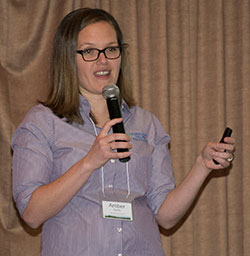 When is field runoff risk the highest, particularly in more northern climates?
When is field runoff risk the highest, particularly in more northern climates?"March is the month," says Amber Radatz, co-director of the University of Wisconsin Discovery Farms. She explained that March is not only the month with the most amount of runoff but the most frequency of runoff events, too.
This may not come as a surprise, as the combination of snowmelt and rain in early spring on frozen or saturated soils create a perfect storm for runoff problems. However, Discovery Farms can back this assumption with data collected 365 days per year from more than 200 sites on almost 20 farms across Wisconsin. Their data shows that runoff occurs on average just eight days per year, and four of those days are in March.
"We know runoff will happen, and it's based a lot on things you can't control. What you definitely can control is what is in that runoff," Radatz explained at the Discovery Farms annual conference held last week in Wisconsin Dells, Wis.
Phosphorus is a big one when it comes to nutrient loss. Radatz offered producers three keys to minimizing these runoff losses:
Control soil loss. In the growing season, Radatz noted that soil loss is closely tied to phosphorus loss. Appropriately matching tillage to the landscape, and utilizing treatment processes like waterways and dams, are ways to control soil movement. Tillage practices are also one of the major factors when trying to control phosphorus depletion. "I think it's very achievable to be under 1,000 pounds of soil loss per acre," Radatz said.
Watch application timing. Radatz said that Discovery Farms has spent a lot of time studying winter manure application. "When the soil is frozen, you can't attribute phosphorus loss to soil loss," she stated. According to their data, "Applications right before runoff events give much higher phosphorus loss," she said.
Consider placement. Lastly, look at where you are placing manure, and think about how you will incorporate it into the soil. "Delivering nutrients below the soil surface can further help reduce phosphorus losses," Radatz said. Still, be sure that incorporation is not stirring up too much soil and adding to the problem. "I think manure incorporation is a great thing as long as you can balance it without losing so much soil," she noted.
(c) Hoard's Dairyman Intel 2015
December 21, 2015








